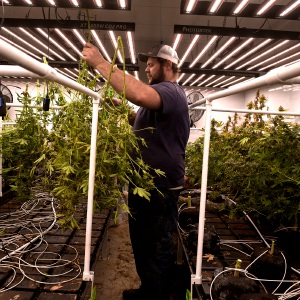SHARON — A proposal to turn a former diner into a marijuana dispensary has been rejected by voters.
Residents took to the polls Tuesday and narrowly rejected a proposal to allow retail marijuana in town by a vote of 137 to 135.
The result poses a risk to Chelsea resident Sean Trombley's plans to turn Sandy's, a former diner that closed after a fire in 2022, into a retail cannabis store with an attached ice cream stand.
Trombley, 31, operates a cannabis cultivation operation in Chelsea called Trombley's House of Cannabis and recently purchased the Sandy's building on Route 14 in Sharon. In August, he submitted a petition signed by 5% of Sharon's voters to the Selectboard asking them to bring the issue to a vote.
Tuesday's results were “surprising and shocking,” Trombley said by phone Wednesday.
“Many people contacted us today asking us to petition for a re-vote,” he said. He's not sure if he will.
For now, he plans to halt all renovation work on the Sandys building until he knows the next steps.
“Eventually we're going to use the land for something, but right now the only retail option is cannabis,” he said.
Meanwhile, Sharon, who opposes retail cannabis, was celebrating.
“I'm glad they voted no,” Sharon resident Alexander Byrd, 70, said by phone Wednesday.
Byrd was concerned that modern cannabis products contain high levels of THC, or tetrahydrocannabinol, the psychoactive component of marijuana that causes a high.
“This is not your father’s pot,” he said.
Research on cannabis potency shows that THC levels have increased more than 10 times over the past 50 years, according to cannabis potency data from the National Institute on Drug Abuse. From the 1960s to the 1980s, average THC levels hovered around 2%. Efficacy levels began to rise steadily in the late 1990s and reached approximately double digits in 2010. In 2022, the average THC level in illegal marijuana seized by the Drug Enforcement Administration was approximately 16%.
Vermont state law limits cannabis flower products to 30% THC and edibles to 5mg per serving. Solid concentrates contain up to 60% THC, and liquid concentrates (those used in e-cigarette cartridges and tinctures) have no potency restrictions.
Byrd said he also had concerns about the proposed cannabis store's proximity to a school. The Sandy location is approximately one mile from the town's elementary school and Sharon Academy high school and middle school campuses.
According to the Cannabis Control Board's “buffer zone” guidance, cannabis retailers are not allowed within 500 feet of school property.
Sharon resident Michael Waterman, 55, said before voting that he was disappointed in Tuesday's results and “all the false narratives that have been pushed.”
He was unfazed by concerns about allowing marijuana sales near schools. “You can see liquor stores and places that sell cigarettes and e-cigarettes from the middle school ball field,” he says.
The closest cannabis retail stores to Sharon are in Bethel and White River Junction, both about a 15-minute drive from town.
Waterman said he traveled to White River Junction to purchase marijuana products at The Tea House.
“I buy gas, drinks and snacks at the WRJ store because it's more convenient than Maple Fields in Sharon,” he said.
He added that a yes vote for retail cannabis would have given Sharon “much-needed small businesses.”
The denial of retail cannabis in Sharon comes just before the state's Cannabis Control Commission decided to stop issuing new retail and cultivation licenses starting Oct. 25.
A week before Tuesday's vote, Trombley said he was confident Sharon voters would meet the trustees' deadline if they approve retail marijuana sales. His plan was to operate two separate facilities in the Sandy's building, one selling cannabis products and the other selling food and ice cream and hosting a food truck.
Since Vermont legalized recreational marijuana sales in 2022, it has required towns to “opt in” to allow retail sales through a referendum.
So far, 77 towns in Vermont have opted for retail cannabis sales, and the state has 86 licensed retail stores. In the Upper Valley, the towns of Bethel, Bradford, Fairleigh, Hartford, Randolph, Strafford, Windsor and Woodstock have opted for retail sales. In addition to White River Junction and Bethel, we also have stores in Bradford, Fairley, Randolph, Windsor and Woodstock.
Most Upper Valley towns that voted on cannabis retail approved it. In Woodstock, voters chose to allow retail marijuana sales in the town but not in the village. Only a handful of towns in Vermont, including Reigate, Highgate, Vernon, New Haven and Castleton, have rejected retail cannabis in polls.
The opt-in strategy has created an uneven distribution of cannabis retailers, with stores concentrated in some densely populated areas such as Burlington, Rutland, and Montpelier.
Concerned about the impact on retailers in a saturated market, the Trustees have decided to temporarily suspend all retail and cultivation licenses from October 25th.
There is currently no timetable for how long the suspension of retail and cultivation licenses starting next Friday will last, creating further uncertainty for Trombly.
“Ultimately, adding retail stores is part of our business plan,” he said. As for when or where that will happen, he added, “We have no idea at this point.”
Christina Dolan can be reached at cdolan@vnews.com or 603-727-3208.

